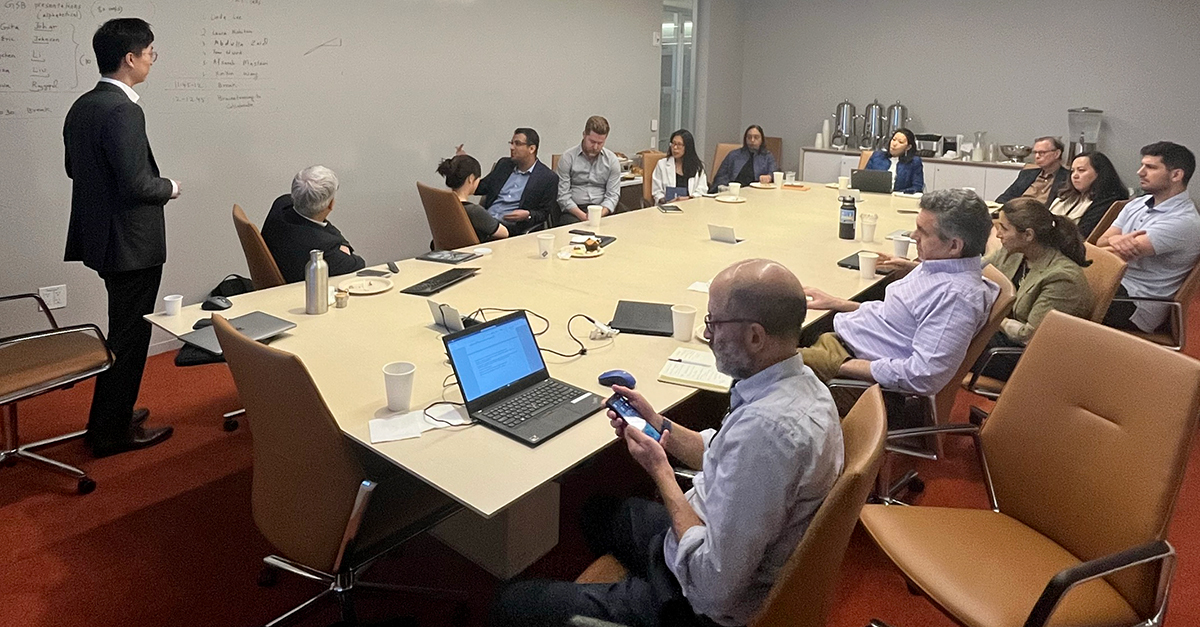Investors want to see a link between challenges that address their biggest problems in sustainable investing and work coming out of the academy.
That was the theme of a recent research exchange co-hosted by the MSCI Sustainability Institute and faculty at Columbia Business School. The forum convened six members of MSCI’s sustainability and climate research team with an equal number of faculty at Columbia to share the focus of their research, questions they are examining and possible areas for collaboration.
Below are highlights from the half-day session.

Presentations by Columbia Business School researchers
Harnessing AI to verify carbon credits and combat misinformation
Bringing integrity to the global carbon-credit market depends in part on the ability of carbon-credit buyers to verify that projects are removing the amount of emissions they claim. “Marketing Tree-planting: A field experiment in India,” examines how technology can be used to motivate individuals to take up tree planting, explained Gita Johar, the Meyer Feldberg Professor of Business at Columbia, who is a faculty collaborator on the global research initiative.
Professor Johar also discussed WeFactCheck, a platform designed to prevent misinformation by using #AI and crowdsourced judgments to scale fact checking. The proof of concept, which is beginning with a focus on climate, uses a machine-learning algorithm to review claims that need to be checked by the crowd. “We know that if we have people contributing to the fact-checking, it increases trust,” Professor Johar said.
Assessing ‘carbon competence’
People who aim to act and consume sustainably first need to know which behaviors, companies and industries have the biggest impact on emissions. But as Eric Johnson, the Norman Eig Professor of Business and his co-authors have found, widespread misestimates of greenhouse gas emissions “suggest that individuals’ efficacy as consumers, investors and citizens is currently hampered by their misjudgments of carbon impact.”
The researchers ask people to rate six activities, from reducing the amount of waste (garbage) they produce by a quarter and consuming half as much meat to purchasing carbon credits equal to 50% of their individual emissions. Overall, people who take the quiz overwhelmingly misestimate the carbon footprint of such activities. “People might as well be throwing darts,” Professor Johnson notes.
Possible solutions include such suggestions as disclosure of carbon emissions on packaging (akin to nutrition labeling on food) and innovations that improve consumers’ ability to choose, such as Google adding the carbon footprint of flights to Google Flights.
Misestimates, if widespread enough, can create risk for companies that may not be priced in, observes Professor Johnson. “People want a firm to behave in a certain way,” he adds. “If they found out a firm is good or bad, it may change demand for their products or services.”
Addressing selection bias in emissions estimates
Companies self-select into emissions disclosure, notes Rongchen Li, a doctoral candidate at Columbia Business School, who finds that carbon-efficient firms disclose their emissions more than firms that are less carbon-efficient.
Failure to adjust for that self-selection leads the estimators to underestimate corporate emissions broadly, finds Li, who also finds that estimates of emissions by intermediaries themselves deter emissions disclosure.
That’s not to suggest estimators should not be estimating, Li notes. “If firms are uncomfortable, they should speak up,” he says.
The financial impact of severe weather events
Natural disasters impact both listed and unlisted companies financially, notes Lisa Liu, an assistant professor of business in the Accounting Division at Columbia Business School, who summarized findings from her research with co-authors and colleagues Sonakshi Agrawal and Shivaram Rajgopal.
A severe weather event reduced the market value of listed companies by 1.3% over the five years ending in 2003, reports Professor Liu, who finds that companies in the consumer discretionary sector tended to be worst hit. The financial impact of severe weather events is more acute for private companies, she notes, pointing to a falloff on the sale of private firms that have been hit by a natural disaster. Private companies that received state financial impact have tended to fare better.
“Private firms are an important segment often ignored in the debate over climate risk,” observes Liu, citing disclosure regulation, which she notes that in much of the world tends to emphasize climate disclosure for public companies.
Learnings about environmental, social and governance risks
Managers of sustainability-focused funds “do not necessarily ‘walk the talk’ in following through on claims of picking stocks that engage in stakeholder-friendly behavior,” finds Professor Shivaram Rajgopal, the Roy Bernard Kester and T.W. Byrnes Professor of Accounting and Auditing and Chair of the Accounting Division at Columbia Business School and his co-author Aneesh Raghunandan find in a paper published in 2022 that examined data from Morningstar that tracked U.S. funds over roughly a decade starting in 2010.
Professor Rajgopal shared some of the other top lines from his research into environmental, social and governance risk:
- Understanding and beginning to quantify corporate culture can be an edge for investors
- Stocks of companies in the business of alcohol, tobacco, and gaming, and fossil fuels such as coal and gas or oil stocks (so-called sin stocks) do not differ in their likelihood of exiting the public market, the cost of raising new equity, or the announcement returns around negative ESG news compared with non-sin stocks, casting further doubt on whether negative screening hurts sin stocks; and
- Lobbying can be lucrative for U.S. companies; generally, a dollar spent on political influence by nearly 2,800 companies over the seven years ended in 2020 was associated with $20.67 of higher annual earnings in the future, Professor Rajgopal and his co-authors find.
Presentations by MSCI
Climate experts on corporate boards
Just over one-third (35%) of companies targeted for engagement by the investor group Climate Action 100+ had at least one climate expert on the board, as of August 2024, noted Laura Nishikawa, MSCI’s global head of ESG research, who added that EMEA had the highest share (48%) of companies with at least one climate expert, compared with 36% in the Americans and 20% in APAC.
“With no consensus definition, investors may face challenges in consistently evaluating the climate expertise of directors,” explained Nishikawa, adding that MSCI’s framework for assessing relevant director experience may help address this challenge.
Renewables in private assets
Exits from renewables by private capital groups have yielded higher returns than exits from oil and gas in each of the eight years ended Dec. 31, 2023, reported Abdulla Zaid, who leads MSCI’s research on sustainability and climate investment solutions in private-capital funds.
“We’ve seen a surge of private funds earmarked for renewables,” said Zaid, who discussed MSCI’s identifying the energy-transition themes of renewable energy, energy storage, carbon removal and green mobility across private assets.
Climate metrics
“We develop metrics designed to address investors’ quantitative problems,” explained James Edwards, executive director for research and development at MSCI’s Climate Risk Center, who noted that MSCI broadly classifies metrics based on their suitability for measuring climate risk or climate impact.
MSCI’s Implied Temperature Rise metric, for example, is a forward-looking climate impact metric that estimates the global temperature rise (in degrees Celsius) if the whole economy had the same carbon budget overshoot or undershoot as the company (or portfolio) in question. “We try to create metrics that are simple and intuitive by output,” explained Edwards, adding that the idea behind the Implied Temperature Rise metric “is to help you assess whether the emissions trajectory of a portfolio aligns with global climate goals.”
Attributing changes in portfolio carbon footprint
Xinxin Wang, who leads MSCI’s research on ESG and climate solutions for the Americas, reviewed the firm’s framework for attributing changes in portfolio-level emissions to their primary drivers. Many investors already know that changes in the carbon footprint of their portfolios may reflect rebalancing, reweighting or fluctuations in financial characteristics that have nothing to do with climate action by portfolio companies, but the framework provides a way to untangle those effects, she explained. “This is similar to performance attribution on the investing side,” she added. “We are answering questions from investors.”
Corporate bonds and climate change risk
How might credit spreads change to reflect climate risk? That’s among the questions that Afsaneh Mastouri, MSCI’s global head of fixed income solutions, and her team examine. “The expected cost of climate change, aggregated across policy and physical risk, can significantly reduce the asset value of a firm and lead to a material widening of credit spreads,” she explained, citing recent findings.
The research shows that even under a scenario with a modest temperature-rise target (3°C/5.4°F), climate-change risk could negatively affect corporate-bond portfolios, with credit spreads could widening to more than double historically narrow levels. “There are signs that investors are taking this information to account,” Mastouri noted.


